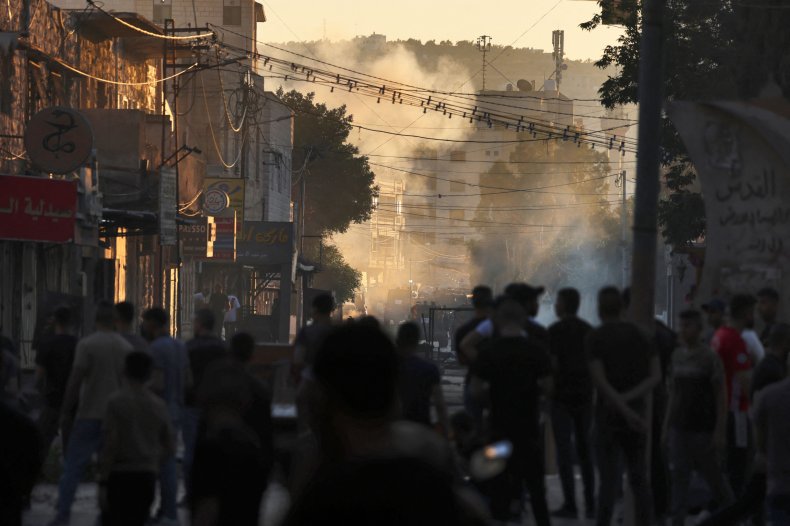Jordan has rejected any notion that it was given advance notice of Israel's large-scale raid against Palestinian factions in the occupied West Bank city of Jenin and has called on the Israel Defense Forces (IDF) to immediately cease operations amid worsening violence.
As Israeli forces conducted rare operations by land and air in the Palestinian territory at the heart of year-long heightened tensions, IDF spokesperson Lieutenant Colonel Richard Hecht told reporters Monday that Jordanian counterparts had been "made aware" of the move via "strategic communications." Hecht declined to go into detail about the nature of such talks.
Reached for comment, however, a spokesperson for the Jordanian Ministry of Foreign Affairs dismissed the remarks as "totally false."
"Jordan was not made aware of the operation by Israel," the spokesperson told Newsweek. "Jordan has repeatedly urged the Israeli government directly and though public announcements to stop all incursions and military operations against Palestinians.
"Jordan has made it clear that reducing the rising tension in the occupied territories will not be achieved through military operations on Palestinian cities," the spokesperson added, "but through a broad political process that creates political horizons, restores hope and eases the economic pressures on Palestinians."
The spokesperson further asserted that "Jordan condemns the current attack on Jenin and urges Israel to stop it immediately."

But the situation showed little sign of de-escalation throughout the day as the IDF conducted new drone strikes and land raids against sites suspected of financing and arming self-styled resistance factions in restive Jenin. Organized Gaza-based Palestinian factions such as Hamas and Islamic Jihad have rallied for support for Palestinians clashing with Israeli troops, as have independent outfits such as the Nablus-based Lion's Den.
At a later press briefing, IDF spokesperson Rear Admiral Daniel Hagari emphasized that the operation was not "an invasion" and that Israeli personnel were "not intending to stay in the camp." Rather, he argued, the IDF has "acted in the camp against terror."
Responding to Newsweek's question regarding communication with Jordan, Hagari said he did not have the relevant information on hand.
Despite attempts by Israeli officials to justify the operation in Jenin, the actions have drawn regional condemnation, including among the few Arab states that have ties with Israel.
Jordan became the second Arab nation to establish diplomatic ties with Israel in 1994, following Egypt's decision to do so 15 years earlier. Since then, four other Arab states, the United Arab Emirates, Bahrain, Sudan and Morocco, have followed suit as part of the United States-brokered Abraham Accords that began in 2020.
Newsweek has reached out to the embassies of Bahrain, Egypt, Morocco and the UAE for comment.
Jordan has historically played a key role in the Israeli-Palestinian conflict, owing especially to the Kingdom's proximity to the West Bank and the Hashemite royal family's longstanding custodianship over Muslim and Christian holy sites in Jerusalem.
After the initial Arab-Israeli War of 1948, Jordan maintained control over East Jerusalem and the West Bank until losing the territory to Israel in the Six-Day War of 1967. Jordan clashed with Palestinian fighters within the Kingdom itself in 1970 and would play a minor role in the subsequent Yom Kippur War largely led by Egypt and Syria against Israel in 1973, two decades before the Oslo Accords between Israel and the Palestine Liberation Organization paved the way for Israeli-Jordanian peace.
Israeli-Palestinian peace talks have repeatedly collapsed over the past 30 years, and Jordan has continued to call for a peaceful solution through which Israelis and Palestinians would have two separate sovereign states. But relations between Israel and Jordan have been repeatedly put to the test, especially by Israeli raids at the revered Al-Aqsa Mosque compound, such as those which occurred in April, sparking fresh Israeli-Palestinian clashes as well as rocket attacks from both Gaza and Lebanon.
"Jordan warns that violence will only lead to more violence," the Jordanian Foreign Ministry spokesperson told Newsweek. "The increasing violence over that last year proves that dealing with the deteriorating situation in the occupied Palestinian Territories through a military prism has only led to more tension and violence.
"Jordan will continue to work for ending violence and restoration of calm as a step towards creating real political horizons toward relaunching direct and meaningful negotiations to achieve just peace on the basis of the two-state solution," the spokesperson added.








